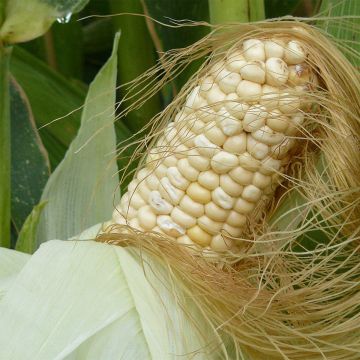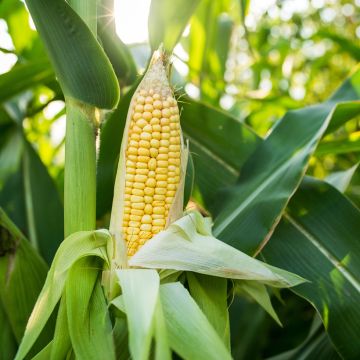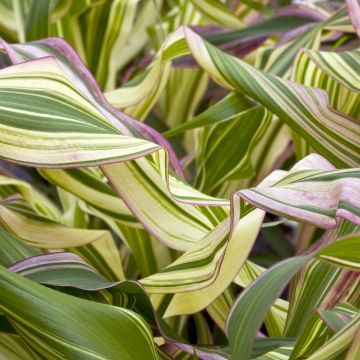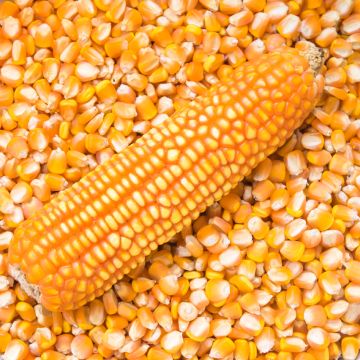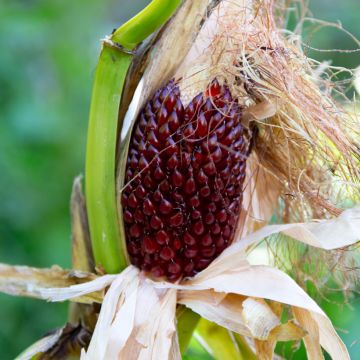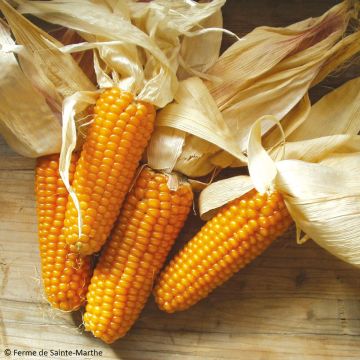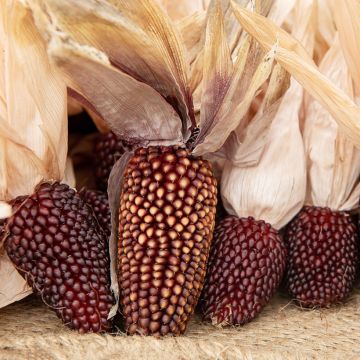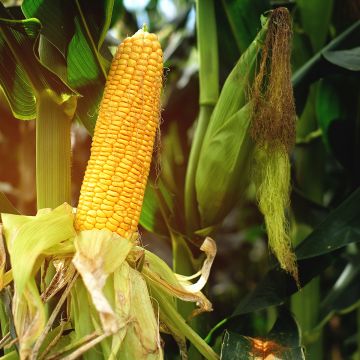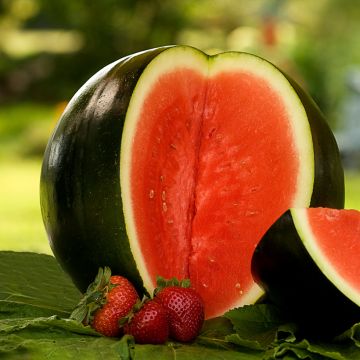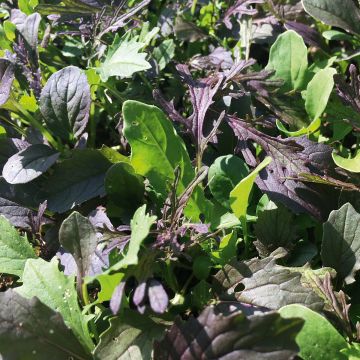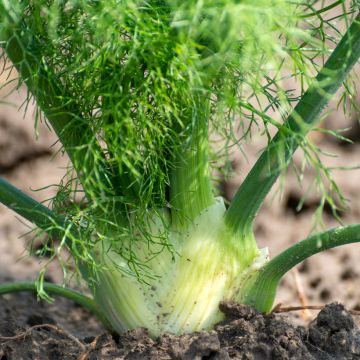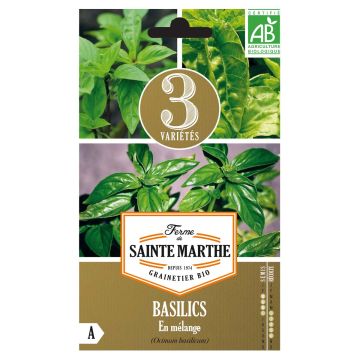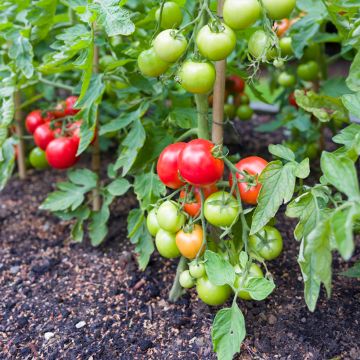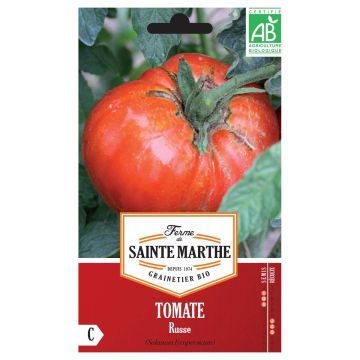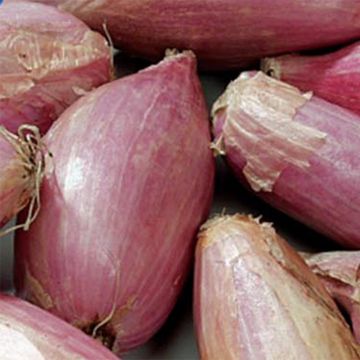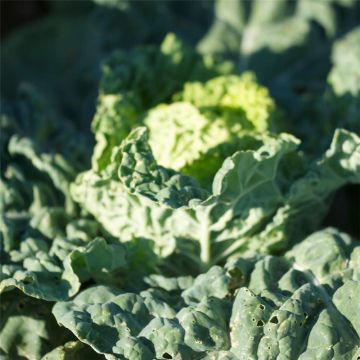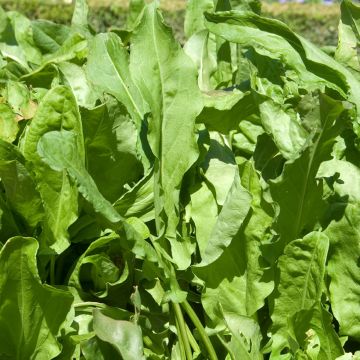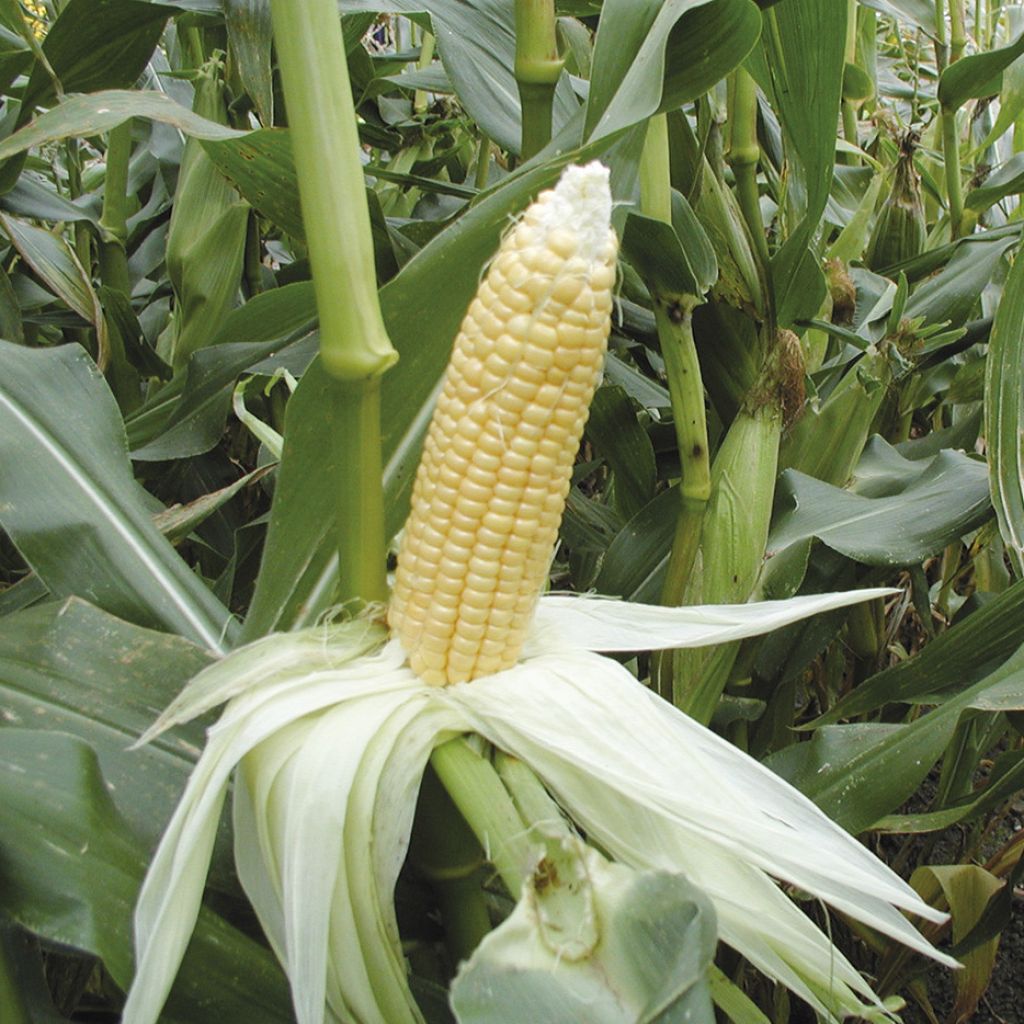

Sweet Corn Golden Bantam
Sweet Corn Golden Bantam
Zea mays Golden Bantam
Sweet Corn
There were only 5 seeds in the packet (so 1 euro per seed!) and only one shoot grew. It produced a sparse spike. I do not recommend it!
A.M, 26/10/2021
This item cannot be shipped to the selected country
Dispatch by letter from €3.90
More information
Schedule delivery date,
and select date in basket
This plant carries a 6 months recovery warranty
More information
We guarantee the quality of our plants for a full growing cycle, and will replace at our expense any plant that fails to recover under normal climatic and planting conditions.
Seed-only orders are dispatched by sealed envelope. The delivery charge for seed-only orders is €3.90.

Description
'Golden Bantam' sweet corn is an ever-popular heirloom variety from North America. The 1.5 to 2 m tall plants produce 1-2 golden yellow ears (15 to 20 cm) filled with plump, sweet and milky kernels. This renowned non-hybrid variety is best eaten fresh to make the most of its outstanding flavour! Sow from March to June and enjoy early harvests from July to October.
Sweet corn (Zea mays), also known as pole corn or sugar corn, is a form of maize that has a particularly high sugar content due to a naturally occurring genetic mutation. It belongs to the Gramineae family alongside wheat, barley and rice. It is highly nutritious, containing more protein and five times more fibre than rice. It is also an excellent source of B vitamins, vitamin C, minerals and trace elements. It has a low glycemic index.
Sweet corn likes deep, light, cool soil that is rich in organic matter. It is a heat-loving plant that needs plenty of sunshine to grow. It can be used to create attractive borders around your vegetable garden and individual plots whilst providing valuable shade for vegetables such as lettuces or cabbages.
Harvesting: Sweet corn is harvested 80 to 120 days after sowing depending on the amount of sunshine and water it has received. The ears are ready to be picked when the silks start to turn brown and the kernels are well developed. Check for ripeness by piercing a kernel with your fingernail - it should be tender and milky. When harvested too late, the sugars turn into starch and the skin becomes tough.
Storing: after harvesting, remove the green husk that is wrapped around the ear. Use quickly, the fresher the better! Sweet corn can also be cooked and frozen or preserved in jars for later use.
Good to know: Traditionally, maize crops were grown alongside squash and bean plants in Central and South America in a system known as Milpa agriculture. Beans would enrich the soil with nitrogen, squash plants would act as ground cover and maize plants would provide support for the beans to scramble up. Start out by sowing your maize plants. When they are about 10 cm tall, sow 2 bean seeds and 2 squash seeds around each young plant.
NB. Organic seeds (in French "AB" for "Agriculture Biologique") are produced from plants that aren't treated with phytosanitary products (insecticides, weed killers). The seeds do not undergo post-harvest treatment. They carry the AB label and are approved by Ecocert, an independent structure.
Report an error about the product description
Harvest
Plant habit
Foliage
Botanical data
Zea
mays
Golden Bantam
Poaceae
Sweet Corn
North America
Annual
Other Sweetcorn seeds
Planting and care
Sowing sweet corn:
Sow corn in full sun after soaking the seeds in warm water for 12 hours. In the garden, sow from April to June in well-warmed soil (at least 12°C). You can install a tunnel over early sowings until temperatures warm up enough. You can start sowing in pots, indoors, as early as March, and plant them in May-June in the garden. Remember to stagger your sowings to spread out the production period. Only sow one variety at a time, or two varieties with staggered flowering: corn hybridizes very easily and you would not harvest the variety you sowed. If your garden is less than 200 m from a cornfield, you will need to protect your crop during flowering.
To sow in rows, dig furrows 3 cm deep, spaced 70 cm apart. Sow thinly. After germination, thin to 25-30 cm apart in the row. If you are only sowing a small number of plants, sow them in a square rather than one or two long rows, pollination will be better ensured.
To sow indoors, place 2-3 seeds per pot in seed compost, mixed with a little compost. Then plant the most developed plant.
Cultivating sweet corn:
Corn likes rich soils: add manure or compost when preparing the soil, in the previous autumn, to enrich the area intended for sowing. The roots are shallow, so hoeing should be very shallow. To promote anchoring, hill up the corn when it reaches 20 cm, then 40 cm in height. Water regularly if it doesn't rain (once a week), and cover the soil with mulch to retain moisture (lawn clippings, straw...).
To facilitate pollination, when the female flowers (located two-thirds up the stem) turn beige, shake the plant. This way, the pollen from the male flower (located at the top of the stem) will fall onto the female flowers.
The corn borer caterpillar, a destructive corn pest, sometimes burrows into the stems, causing them to break. As a preventive measure, shred crop waste before using it (compost or mulch). Practice good crop rotation by not growing corn in the same plot for 3 or 4 years. In case of a severe attack, you can spray a solution of Bacillus thuringiensis.
Seedlings
Care
Intended location
-
, onOrder confirmed
Reply from on Promesse de fleurs
Vegetable seeds
Haven't found what you were looking for?
Hardiness is the lowest winter temperature a plant can endure without suffering serious damage or even dying. However, hardiness is affected by location (a sheltered area, such as a patio), protection (winter cover) and soil type (hardiness is improved by well-drained soil).

Photo Sharing Terms & Conditions
In order to encourage gardeners to interact and share their experiences, Promesse de fleurs offers various media enabling content to be uploaded onto its Site - in particular via the ‘Photo sharing’ module.
The User agrees to refrain from:
- Posting any content that is illegal, prejudicial, insulting, racist, inciteful to hatred, revisionist, contrary to public decency, that infringes on privacy or on the privacy rights of third parties, in particular the publicity rights of persons and goods, intellectual property rights, or the right to privacy.
- Submitting content on behalf of a third party;
- Impersonate the identity of a third party and/or publish any personal information about a third party;
In general, the User undertakes to refrain from any unethical behaviour.
All Content (in particular text, comments, files, images, photos, videos, creative works, etc.), which may be subject to property or intellectual property rights, image or other private rights, shall remain the property of the User, subject to the limited rights granted by the terms of the licence granted by Promesse de fleurs as stated below. Users are at liberty to publish or not to publish such Content on the Site, notably via the ‘Photo Sharing’ facility, and accept that this Content shall be made public and freely accessible, notably on the Internet.
Users further acknowledge, undertake to have ,and guarantee that they hold all necessary rights and permissions to publish such material on the Site, in particular with regard to the legislation in force pertaining to any privacy, property, intellectual property, image, or contractual rights, or rights of any other nature. By publishing such Content on the Site, Users acknowledge accepting full liability as publishers of the Content within the meaning of the law, and grant Promesse de fleurs, free of charge, an inclusive, worldwide licence for the said Content for the entire duration of its publication, including all reproduction, representation, up/downloading, displaying, performing, transmission, and storage rights.
Users also grant permission for their name to be linked to the Content and accept that this link may not always be made available.
By engaging in posting material, Users consent to their Content becoming automatically accessible on the Internet, in particular on other sites and/or blogs and/or web pages of the Promesse de fleurs site, including in particular social pages and the Promesse de fleurs catalogue.
Users may secure the removal of entrusted content free of charge by issuing a simple request via our contact form.
The flowering period indicated on our website applies to countries and regions located in USDA zone 8 (France, the United Kingdom, Ireland, the Netherlands, etc.)
It will vary according to where you live:
- In zones 9 to 10 (Italy, Spain, Greece, etc.), flowering will occur about 2 to 4 weeks earlier.
- In zones 6 to 7 (Germany, Poland, Slovenia, and lower mountainous regions), flowering will be delayed by 2 to 3 weeks.
- In zone 5 (Central Europe, Scandinavia), blooming will be delayed by 3 to 5 weeks.
In temperate climates, pruning of spring-flowering shrubs (forsythia, spireas, etc.) should be done just after flowering.
Pruning of summer-flowering shrubs (Indian Lilac, Perovskia, etc.) can be done in winter or spring.
In cold regions as well as with frost-sensitive plants, avoid pruning too early when severe frosts may still occur.
The planting period indicated on our website applies to countries and regions located in USDA zone 8 (France, United Kingdom, Ireland, Netherlands).
It will vary according to where you live:
- In Mediterranean zones (Marseille, Madrid, Milan, etc.), autumn and winter are the best planting periods.
- In continental zones (Strasbourg, Munich, Vienna, etc.), delay planting by 2 to 3 weeks in spring and bring it forward by 2 to 4 weeks in autumn.
- In mountainous regions (the Alps, Pyrenees, Carpathians, etc.), it is best to plant in late spring (May-June) or late summer (August-September).
The harvesting period indicated on our website applies to countries and regions in USDA zone 8 (France, England, Ireland, the Netherlands).
In colder areas (Scandinavia, Poland, Austria...) fruit and vegetable harvests are likely to be delayed by 3-4 weeks.
In warmer areas (Italy, Spain, Greece, etc.), harvesting will probably take place earlier, depending on weather conditions.
The sowing periods indicated on our website apply to countries and regions within USDA Zone 8 (France, UK, Ireland, Netherlands).
In colder areas (Scandinavia, Poland, Austria...), delay any outdoor sowing by 3-4 weeks, or sow under glass.
In warmer climes (Italy, Spain, Greece, etc.), bring outdoor sowing forward by a few weeks.

































